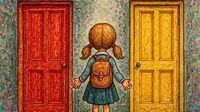In recent weeks, a new game called "Red Door, Yellow Door" has gained alarming popularity among schoolchildren, particularly through TikTok, sparking concerns among parents and mental health professionals alike. The game, which involves participants entering a trance-like state while being guided by a peer, has raised serious questions about its psychological impact on young players.
On April 2, 2025, reports surfaced detailing how children are secretly gathering in groups to play this game, which they describe as a form of psychological experiment. Participants take on roles as either the "player" or the "guide." The player lies down, often with their head on the guide's knees, while the guide massages their temples and repeats phrases like "Red door, yellow door, door of any color." The player is instructed to visualize doors, and when they see one, they must lower their hands. If they enter a deep trance and stop responding, the guide must awaken them to prevent any negative effects.
As the game progresses, the guide asks the player what they see, including descriptions of rooms and the presence of a "black man," which often frightens players. Videos shared on social media show children screaming and reacting in fear, raising alarms about the potential psychological ramifications of such experiences.
Ekaterina Mizulina, head of the Safe Internet League, has voiced strong concerns regarding the game's impact on children. She warned that due to their impressionability, the effects of the game might resemble narcotic intoxication and could lead to serious mental health issues. "The strong temple massages can cause dizziness and nausea, leading to muscle tension and stress. After exiting such a trance, children may suffer from distorted perceptions of reality and severe anxiety," Mizulina stated.
Psychologists have begun to weigh in on the phenomenon, with Olesya Tolstukhina, a clinical psychologist, noting that while imaginative play is a natural part of childhood development, the nature of this game raises red flags. "Almost any game can be potentially traumatic, from tag to video games. However, the fantasy involved in this game is significant for cognitive development and strategic planning," she explained. Yet, she cautioned that if a child struggles to distinguish between reality and fantasy, or if their fantasies skew excessively negative, it could indicate deeper issues.
Another expert, Ekaterina Dubrovinskaya, emphasized that adolescence is a critical period for identity formation, which can lead to experimentation with behaviors and experiences. "The techniques used in 'Red Door, Yellow Door' resemble self-hypnosis, where concentration on a specific object induces a trance-like state. This can alter thought processes and stimulate imagination," she elaborated.
However, not all reactions to the game have been negative. Some participants claim the game helps them relax and offers a unique way to connect with friends after school. A sixth-grade student from Kyiv noted, "My friend described seeing an old house with crooked mirrors. She ran from a room with clocks but ended up in another room with many strange people. She barely woke up, and now she sleeps poorly. But almost our entire class is playing this game!" This sentiment reflects a broader trend among youth seeking novel experiences in a post-COVID world where real-life interactions have diminished.
Despite the thrill it provides, child psychologist Natalia Valedova warned of the physiological risks involved in the game. She highlighted that the massages are performed by untrained peers, which could lead to potential harm, including disrupted blood circulation and headaches. "If a child has an aneurysm, this could lead to a stroke. The game can induce not hallucinations, but rather thought-forms that may trigger fears or anxiety, especially in impressionable children," Valedova stated.
The game has also faced scrutiny for potentially fostering a culture of submission among children. Psychologist Vladimir Mamko expressed concerns about how such games might prepare children for conformity and a lack of independent thought. He noted that the game's mechanics resemble psychological techniques used in therapy, where distraction is employed to alter states of consciousness.
As parents grapple with the implications of this trend, many have begun to compare the dangers of "Red Door, Yellow Door" to previous social media fads that led to harmful behaviors, such as the "Blue Whale Challenge." The fear is that this game could similarly lead to serious psychological consequences, including the onset of mental illness in susceptible children.
Experts advise parents to maintain open communication with their children, discussing the games they engage in and the content they consume online. Valedova suggested that instead of outright bans, parents should explore these interests with their children, understanding their perspectives while guiding them toward healthier ways to socialize and play.
Ultimately, while "Red Door, Yellow Door" may seem like a harmless trend, the underlying psychological risks it poses to children cannot be ignored. As the game continues to spread, it serves as a reminder of the importance of parental vigilance and the need for informed discussions about mental health and safety in the digital age.







